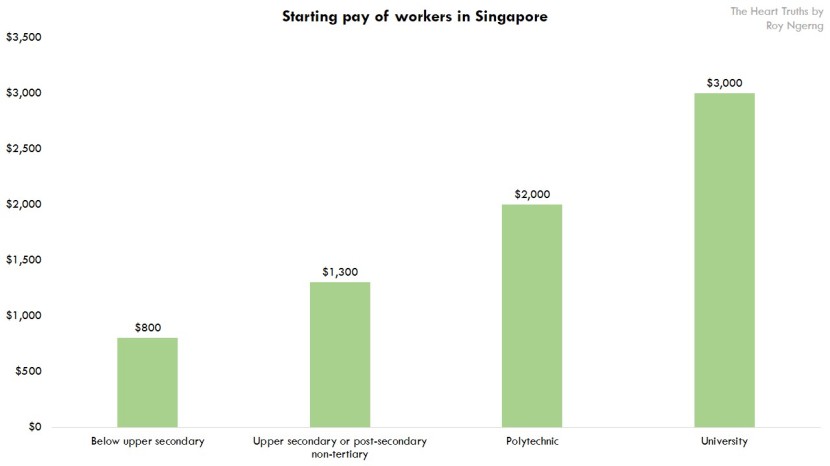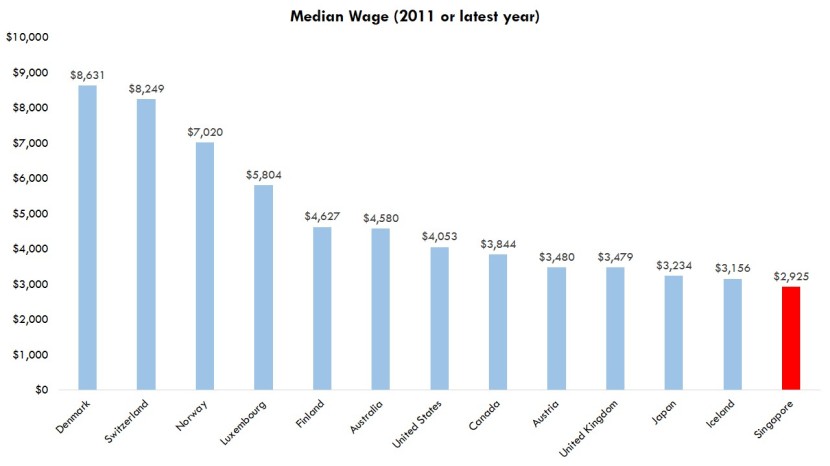Last week, I had written about how Prime Minister Lee Hsien Loong was quoted to have said that, “Polytechnic students have many good options after graduating and need not just aim for a university degree.”
This was echoed by National Development Minister Khaw Boon Wan echoed Lee’s statement by saying that, “If they cannot find jobs, what is the point? You own a degree, but so what? That you can’t eat it. If that cannot give you a good life, a good job, it is meaningless,” and Minister for Social and Family Development Chan Chun Sing , who had said that, “It’s not the degree or the diploma… that is most important.”
As I had discussed, it is irrelevant and illogical for the PAP ministers to dissuade Singaporeans from pursuing a university degree, when the outcomes of being a university or polytechnic graduate is immense – the starting pay of university graduates is $3,000, while that of a polytechnic graduate is $2,000.
But, how does their starting pay compare with the other high-income countries? Perhaps things are not that bad for Singapore, we might think? Let’s take a look.
For the first comparison, the starting pay for university graduates is taken to be $3,000, and that for polytechnic graduates is at $2,000. I will use the estimate of $1,300 for workers with upper secondary or post-secondary non-tertiary education, and $800 for workers with below upper secondary education (Chart 1).
Chart 1
When you compare the starting pay of workers of the different education levels in Singapore with the other countries, you will see that university graduates (dark blue bars) in Singapore earns the highest wages relative to someone with a below upper secondary education (grey bars) (Chart 2)!
Chart 2: OECD Indicators Education at a Glance 2013
In fact, the disparity in wages between a university graduate and Singaporeans with a below upper secondary education is the widest among the high-income countries (Chart 3)!
Chart 3: OECD Indicators Education at a Glance 2013
But how does wages grow (or not) over time?
As I had discussed, the pay of a polytechnic graduate, and that of someone with post-secondary education and below upper secondary education, is likely to stay stagnant or decrease over their lifetime – for workers who earn a starting pay of $2,000 or below, you can see that their pay would stay stagnant or decline over time. However, for a university graduate (someone who earns $3,000 and above), their pay is likely dramatically increase – the pay for a person who earns $3,000 rises over time (Chart 4).
Chart 4: Report on Wages in Singapore, 2011
As such, to look at the next comparison, we can assume that across the different age groups, the median wage for a polytechnic graduate will remain at $2,000, but for a university graduate, the median wage would increase to about $5,000, as an estimate. Workers with post-secondary-educated workers will also see their median wage remain at $1,300 and that for below upper secondary education, it will also remain at $800 (Chart 5).
Chart 5
Thus when we look at the comparison of the wages of Singaporeans with the other countries across the age groups, once again, we would see that university graduates (dark blue bars) would earn a higher wage, relative to someone with a below upper secondary education (grey bars), and not only that, the disparity widens – because university graduates are most likely to be the only ones who will see significant pay increases over their lifetime (Chart 6)!
Chart 6: OECD Indicators Education at a Glance 2013
And again, across the age groups, Singapore shows the widest wage disparity between a university graduate and someone with a below upper secondary education (Chart 7).
Chart 7: OECD Indicators Education at a Glance 2013
Not only that, this wage disparity has also seen the fastest rise between the starting pay and pay as the workers age, among the high-income countries (Chart 8).
Chart 8: OECD Indicators Education at a Glance 2013
And if we compare the wage disparity between a university and a polytechnic graduate, the disparity is also the highest in Singapore (Chart 9).
Chart 9: OECD Indicators Education at a Glance 2013
Are you flabbergasted by the severe wage disparity in Singapore?
Now, do you know why Singapore has the highest income inequality among the high-income countries (Chart 10)?
Chart 10: OECD StatExtract Income Distribution and Poverty, Key Household Income Trends, 2012
And because low-wage workers are paid the lowest wages, Singapore also has the highest estimated poverty rate among the high-income countries, and even countries in the region (Chart 11)!
Chart 11: The Heart Truths Poverty in Singapore Grew from 16% in 2002 to 28% in 2013
The question we have to ask is - why are the wage levels in Singapore pegged so closely to the educational levels? But perhaps the more important question to ask is – why are the different educational levels of such differing “standards” that the wage for the different educational levels are so distinctly separate?
Is this a policy decision to alleviate the status of a university education, while delineating that of a polytechnic education, and even further marginalising those without either a university or polytechnic education?
Again, PM Lee might have said that, “every school is a good school“, but why are the so-called-”equally”-good schools created with such differential standards, and consequently pay the graduates so differently? Or are these differential standards a policy decision to segregate Singaporeans?
But what’s more – do you know that Singapore already pays the workers here the lowest wages (Chart 12)? That means that for a low wage worker, he or she would be paid the worst among all the high-income countries. Not only that, the wages of university graduates have also been depressed in Singapore.
Chart 12: International Labour Organisation Data collection on wages and income
The problem of wage depression is thus one that strikes all Singaporean workers.
So, the final question we have to ask ourselves is – why are the other countries able to pay more equitable wages for their workers? Why are the workers in other countries more equally valued than in Singapore? Also, why do workers with equivalent educational qualifications in other high-income countries paid higher wages than Singaporeans as well? Mind you, Singapore has the highest GDP per capita, so why is it that poorer countries are able to pay higher wages to their citizens, but Singapore cannot?
As I had written about, the wage inequality that persists in our country is one that has its roots in the education system – our people are divided early on in life into the different educational pathways that the system has deemed them to fit, and this carries on until later on in life, where they continue to be stuck in their fixed roles and earn a predetermined salary.
However, does a government – any government for that matter – has a right to predetermine or decide how the abilities of its people should be destined? Should the PAP government sculpt the system to such an extend that the role that we are conferred with early on in life would predominantly stick with us for the rest of our lives?
Why did the PAP government operate with the planning parameters that sees it necessary to demarcate schools in unequal terms, and to have such unequal wage patterns? If so, is “every school (truly) a good school”, or is this only lip service?
Singaporeans have a right to know the planning parameters that the PAP government uses in planning our education system and job market. Singaporeans have a right to know why our education system has such unequal outcomes, and why our wages are also so unevenly distributed. If most Singaporeans are asked if they believe that such inequality should exist in the system, the most likely answer would be an affirmative, “NO”.
Indeed, is it in Singapore’s and Singaporeans’ interest to continue to see such widening inequality in Singapore? Is it in our long term interests to see such an unequal education system and job market pull our society apart, which can lead to intangible problems down the road, of distrust among the people, and a sense of disempowerment for Singaporeans who are seemingly left behind?
*****
If you are inspired to want to discuss more about how we can change the education system in Singapore, you can join other Singaporeans at this upcoming workshop to design solutions to make the education system more equal in Singapore.
For more information, you can visit the Facebook event page here.
Roy Ngerng
*The author blogs at www.TheHeartTruths.com












